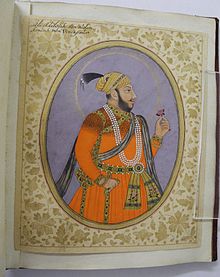Ali Adil Shah II
| ALI ADIL SHAH KHURD BIJAPUR | |||||
|---|---|---|---|---|---|
| ADIL SHAHI EMPEROR | |||||
 |
|||||
| Reign | 1656–1672 | ||||
| Predecessor | Mohammed Adil Shah | ||||
| Successor | Sikandar Adil Shah | ||||
| Died | 24 Nov 1672 Bijapur |
||||
| Burial | Bara Kaman | ||||
| Spouse | Khurshida Khanum | ||||
| Issue |
Shahar Banu Begum (Padshah Bibi) Husain Sikandar Adil Shah |
||||
|
|||||
| House | House of Osman | ||||
| Dynasty | Adil Shahi Empire | ||||
| Father | Mohammed Adil Shah | ||||
| Religion | Sunni Islam | ||||
| Full name | |
|---|---|
| Sultan Adil Shah Sani |
On the death of Mohammed Adil Shah on November 4, 1656, Ali Adil Shah II, a youth of eighteen, succeeded to the throne of Bijapur through the efforts of the Prime Minister Khan Muhammad and the Queen, Badi Sahiba, sister of Qutb Shah of Golkonda.
His accession signaled disasters to the Kingdom and his reign marked the first phase of the decline of the mighty Bijapur Kingdom.
Shah Jahan, anxious to annex Bijapur to his empire, found a pretext in the legitimacy of Alis parents. On Aurangzeb’s plea, Shah Jahan sanctioned the invasion of Bijapur and gave him a free hand to deal with the situation. This sanction of such a war was wholly unrighteous. Bijapur was not a vassal state of the Mughals; but an independent and equal ally of the Mughal Emperor, and the latter had no lawful right to confirm or question the succession at Bijapur. However, Aurangzeb, had to raise the siege and rush to the north for the war of succession to the Mughal throne.
With Muhammad’s death and Ali’s accession disorder had begun in the Karnataka. The Nayaks tried to recover their former lands. (Bangalore the Capital of Karnataka was Bijapur’s administrative headquarters for controlling these feudatories by Kempegouda). On the other hand, Shivaji increased the momentum of acquiring more and more Bijapur territory and carved an independent Maratha state, while his diplomacy prevented any Mughal Bijapur coalition against him.
At the court things were even worse. With the coming of a young and weak ruler, the party factions and struggle for supremacy was at its zenith. To aggravate the evil, Aurangzeb intrigued with Bijapur nobles and succeeded in winning over most of them.
...
Wikipedia
